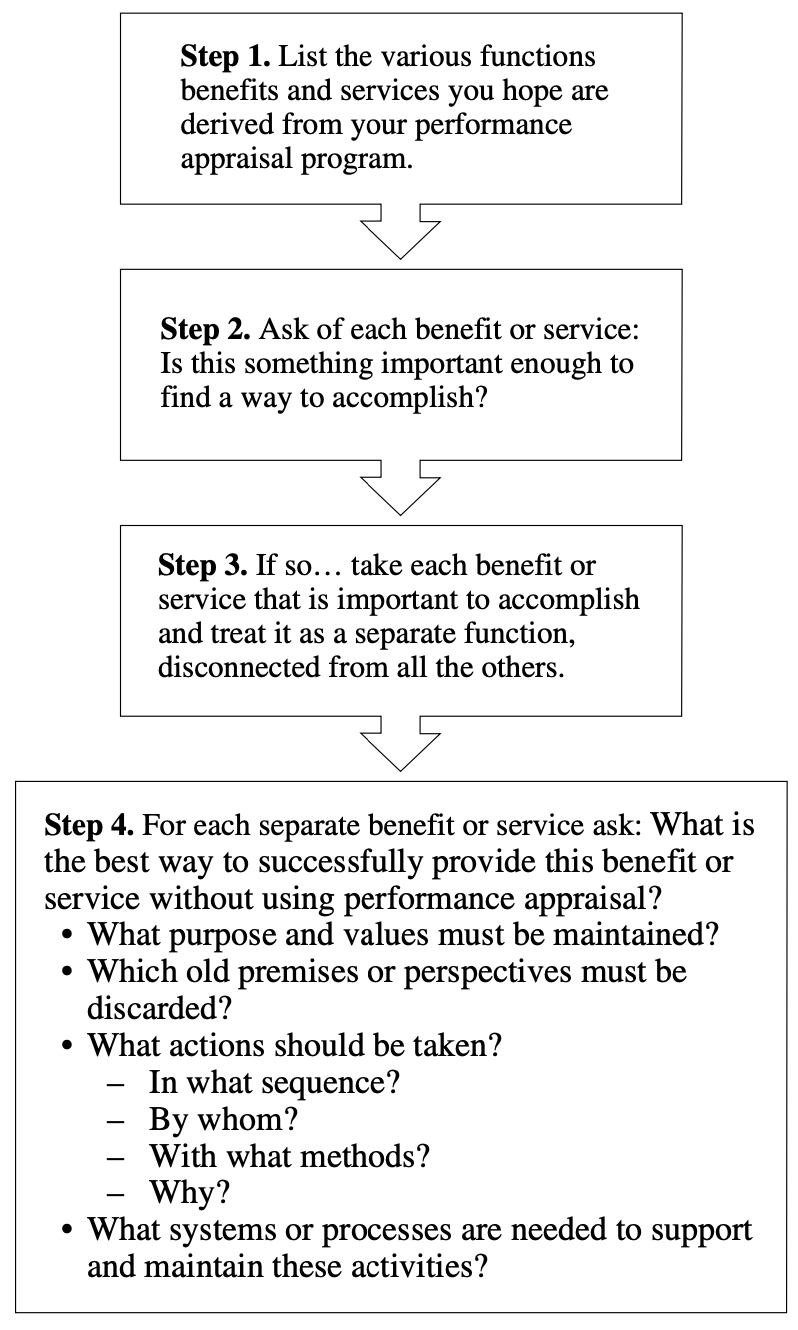If we get rid of performance appraisal, what do we do instead?
Peopleware lists a set of management techniques that are detrimental to teamwork. Every one of those is a technique that we’re likely to associate with an appraisal system.
To put a bit more weight into its arguments, Peopleware summons Deming:
Remove barriers that rob people in management and in engineering of their right to pride of workmanship. This means [among other things] abolishment of the annual or merit rating and of management by objectives.
While Peopleware does not say what we should do instead, it does highlight the risks of following convention without giving critical thought.
Deming’s point is that MBO and its ilk are managerial cop-outs. By using simplistic extrinsic motivators to goad performance, managers excuse themselves from harder matters such as investment, direct personal motivation, thoughtful team formation, staff retention, and ongoing analysis and redesign of work procedures.
Our point here is somewhat more limited: Any action that rewards team members differentially is likely to foster competition. Managers need to take steps to decrease or counteract this effect.
At a conference, someone once asked Deming:
“If we eliminate performance appraisals, as you suggest, what do we do instead?”
Deming’s reply:
“Whatever Peter Scholtes says.”
Deming brings us to this wonderful book by Peter Scholtes, titled The Leader’s Handbook. The book has a chapter on the very topic in question.
Like Peopleware, The Leader’s Handbook also warns us of the perils of traditional appraisal systems. And like Peopleware, it does not give away any answers.
It, too, asks us to think critically and to discover for ourselves a model that may work. It makes three suggestions…
When people ask, “If we get rid of performance appraisal, what do we do instead?” my first response is: “Think differently!” Behind this somewhat flippant response is the importance of getting rid of the dysfunctional premises. If managers don’t purge these assumptions about the nature of people and work they will not develop true alternative practices, only minor variations on the same theme.
Think differently!
That’s the first. The other suggestion is:
If something is demonstrably the wrong thing to do, if it is harmful to you and others, you don’t necessarily need an alternative in order to cease doing it.
Just stop doing it!
That’s two. And then finally, Scholtes suggests we ‘Debundle’ the existing system, and then inspect each process on its own merit. If the process serves a purpose that is important to achieve, we can rethink our methods. If is not important, or is detrimental to the performance of the organisation, we can scrap the process entirely. Scholtes describes the thought process in the form of a flow chart:

Relevant
-
Why conventional management doesn't work for knowledge work
Conventional management is based around the idea of coercion. When people don’t naturally enjoy their work, conventional management makes sense. Motivation (or fear?) has to be induced in order to...
-
Beyond carrots and sticks
As he grew older, Douglas became more and more disturbed by the negative attributions his father ascribed to the unemployed and homeless (that they’re shiftless and lazy, etc., much the...
-
Management practices that counteract teamwork
The ‘icide’ suffix indicates the killing of something, e.g. pesticide, the killing of pests, and homicide, the killing of a person. Tom DeMarco, in the context of a team, coined...
Recent posts
-
A worked example of Value-Stream Mapping
Value-stream maps can be daunting at first glance like these maps on Google Images. ValueTech (a made-up software company for the purpose of our example) thought so too until they...
-
Test pyramid and ice-cream cone
The test ice-cream cone is a strategic anti-pattern. It indicates excessive reliance on expensive and flaky forms of testing, such as manual and end-to-end, especially for components that could otherwise...
-
Notes on Value-Stream Mapping
A value stream is the sequence of activities required to design, produce, and deliver a good or service to a customer. – Value Stream Mapping by Karen Martin and Mike...